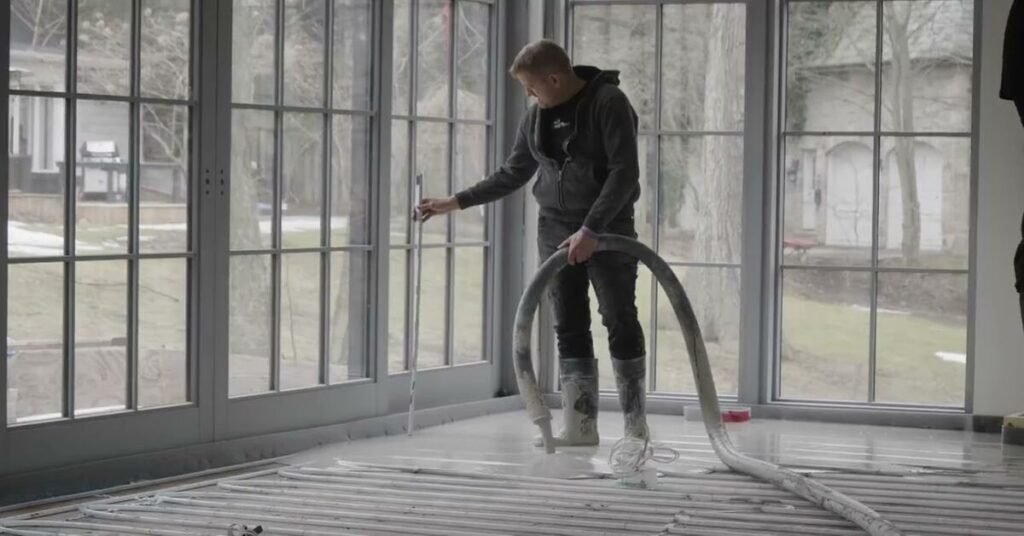Gypsum concrete, or gypcrete, is a suitable alternative to traditional concrete in residential construction projects. The material is made by mixing gypsum-based cement with sand and water. Gypsum concrete has a lightweight composition and is used as a floor underlayment material in multi-story buildings featuring wood-frame and concrete constructions. Here are six features of gypsum concrete that make it unique:
1. Thermal Insulation
Gypsum-based underlayment provides better thermal insulation because of its low thermal conductivity. The material absorbs and radiates heat gradually, resulting in more consistent indoor temperatures and greater energy efficiency. Traditional concrete absorbs and releases heat more rapidly, causing temperature fluctuations. The thermal efficiency of gypcrete makes it a suitable material for climates with extreme temperature fluctuations. You can use the underlayment with a radiant floor heating system to maintain indoor temperatures during cold seasons. The material distributes the radiant heat uniformly and helps to eliminate cold spots.
2. Fire Rating
Gypsum concrete is used in fire-rated floor assemblies because it provides fire resistance. The underlayment is a fire retardant due to the gypsum content. Gypsum has a significant amount of water within its crystalline structure, which evaporates into the air when the underlayment is exposed to extreme temperatures. The evaporation reduces heat transmission, protecting your home and furnishings during fires. Gypsum concrete doesn’t emit fumes when exposed to high temperatures, further contributing to your safety. The material also provides a fire barrier that slows down the spread of flames and combustible elements.
3. Sound Attenuation
Another unique characteristic of gypsum concrete is its sound-muffling capability. The material minimizes the transmission of impact noise between floors and can help reduce airborne noise. Impact noise is produced by foot traffic, moving furniture, or dropping items on the floor. Airborne noise comes from conversations, televisions, and stereos. You can apply gypsum concrete on floors and ceilings to control internal noise and prevent external sounds from entering your space. Gypsum concrete is ideal for spaces like recording studios, learning centers, and other multi-level residential and commercial buildings that require acoustic efficiency.
4. Lightweight Composition
Gypsum concrete is lighter than traditional concrete because of its gypsum base. The lightweight composition makes it suitable for multi-level buildings and other applications that require lower structural loads. Gypsum concrete’s lightweight nature also makes it easier to transport and handle during installation. The concrete is mixed and poured on the construction site and offers fast installation and drying times. Gypsum’s lightweight composition doesn’t compromise its strength, making it a reliable material for high-rise constructions with strict weight and durability requirements.
5. Moisture Resistance
A gypsum concrete pour is suitable for a building foundation because of its moisture resistance. Moisture is a significant concern in construction as it leads to mold, mildew, and structural damage. You can use gypsum-based cement to eliminate these concerns without compromising your home’s strength and durability. The material can be reinforced with waterproofing layers that serve as vapor barriers. Gypsum concrete is also resilient against humidity, keeping the material from swelling or shrinking with weather cycles.
6. Crack Resistance
Gypsum concrete subfloors are crack-resistant, making them a good choice for constructions that will have heavy foot traffic. The material offers a high level of resilience against impact and is used to create sturdy underlayment layers. Gypsum concrete subfloors support heavy furniture, equipment, foot traffic, and other loads found in residential units. You can also use it in commercial buildings as the material maintains its flat, even level, making it ideal for various floor treatment installations. Gypsum underlayments support hardwood, tile, vinyl, carpet, and other flooring options.
You Can Also Discover: Regular Floor Maintenance
Find High-Quality Gypcrete Today
Gypsum is a naturally occurring mineral that makes gypcrete a sustainable building material. The concrete is eco-friendly and offers many benefits, like self-leveling abilities. Contact a floor underlayment supplier and installer today to learn more about using gypsum concrete in your next project.


